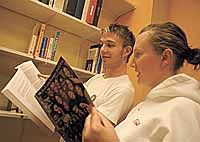| Students Adam Hight and Tabitha Hribar look over some of the books in the lending library in the clinic. The facility is a good resource for health information. |
Ask most anyone what kind of service a college campus clinic performs, and most people would say that such a place would probably take care of things like minor illnesses that students incur, and patching up cuts and bruises for anyone who comes in and maybe giving out a shot or two once in awhile.
But when one examines it, college clinics are usually much more involved than that, in fact it is surprising the services they offer, and often for more than just students.
The College of Eastern Utah Health and Wellness Clinic that is located in the old Student Activity Center on the Price campus is one example of a modern clinic that serves a wide variety of people, in fact in some cases the general public.
“While it’s true that we offer primary care for the students, faculty and staff on campus when they are here we are much more than just that,” says Danielle Pendergrass the nurse practitioner who manages the clinic under the direction of Dr. Rex Nielsen, a local gynecologist. “We have many other services that we offer, some to the general public.”
One of those things is the fact that the clinic is the Planned Parenthood Center for the Price area. The clinic offers the entire gamut of Planned Parenthood services including pap smears, STD testing and birth control counseling and help.
The Planned Parenthood connection helps the clinic to survive in a crowded world of medical care. That’s because it gets Title 10 federal funds to run its operations. Funding also comes from the college itself and from the local United Way as well.
“All those funding sources are important to keep us in business,” states Pendergrass. “But we don’t directly compete with the local doctors or even the hospital. We actually work in conjunction with them.”
| Danielle Pendergrass is the clinic’s director. |
But running Planned Parenthood is only part of the way the clinic adds to the entire community. It also is there for those who have a hard time paying for medical care on their own.
“The clinic helps the working poor as well,” indicates Pendergrass. “Sometimes people who work in low paying jobs have no health insurance or a way to even pay just to see a doctor. We charge on a reduce rate to people with that problem.”
The clinic doesn’t serve people who are on medicaid or on the primary care network.
Since the clinic is there for the students they also serve students who have little money and cannot pay for services through a special “hardship account” that is paid into through student fees.
One of the other function of the center is to deal with traumatic experiences, including rape. Alleman heads up a group of 14 employees on campus who are certified rape victim advocates. They give follow up support and advice on problems associated with rape.
But with students the primary goal of the clinic is the “wellness” part of the operation.
“We spend a lot of time on education,” says Kate Alleman the clinic nurse who operates the education program. “We do a lot of classes on campus for the students and are involved in the freshman orientation day as well as the course they take.”
So what would a program that is working with primarily 18-22 years olds deal with?
“We deal with all health issues but with the students we work a lot on sun damage prevention, safety, living healthy life styles, drug and alcohol dependence issues and STD’s,” says Alleman.
| Darlene Severeid, director of counseling at CEU, gets her blood pressure checked at the clinic by Kate Alleman, the practicing nurse at the facility. The clinic offers services to students, faculty, staff and even the general public. |
While all are important education goals, the last one, STD’s, is a growing problem on college campus’.
“We are really concerned about STD prevention,” states Alleman. “The kids seem to less and less careful these days.”
Both Alleman and Pendergrass find womens health issues to be extremely important. Both say that empowering women to take charge of their health is important and that knowledge is the key to that.
Pendergrass says that they see a couple of emergency situations a year where they must send someone to the hospital, but most of the time they can handle what comes up. The clinic serves about 1500 people a year.
“We also have a lending library full of books on health issues,” said Alleman as she walks into a brightly colored orange and cream colored room.
Books and videos with information on health issues line the walls. Students often want information on health issues but don’t know where to turn. The clinic often has the answer in it’s library.
So the clinic on the CEU campus is much more than it appears.
And it’s what’s is inside that counts.

